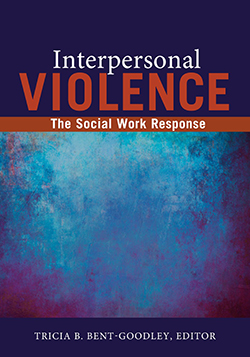Social Work Professor Offers New Insight into Intimate Partner Violence
By Paul R. Pace
Interpersonal Violence: The Social Work Response, Tricia B. Bent-Goodley, Editor

Tricia Bent-Goodley, Ph.D., MSW, LICSW, LCSW-C, professor emeritus at the School of Social Work at Howard University in Washington, D.C., has released a new book, “Interpersonal Violence: The Social Work Response” (NASW Press, 2023). She answers questions about the book.
What inspired this text?
I had such a positive response to (my previous NASW Press book, The Ultimate Betrayal: A Renewed Look at Intimate Partner Violence (2011). Over the years, I have heard from many practitioners and students who told me how helpful the book was in grounding their knowledge of domestic violence. This was inspirational for sure, but what really inspired me were letters from survivors thanking me for writing the book. They appreciated being able to hear and see their experience. Their stories really inspired me to want to do more.
This new book focuses more broadly on interpersonal violence, to include intimate partner violence, sexual assault and human/sex trafficking. It really helps social workers understand co-occurrences and the intersection between the different forms of interpersonal violence, and we do a deeper dive in each of the areas. Also, I have some of the best researchers and practitioners writing in this book. It is really exciting.
What are the key takeaways?
We still have a lot to learn, but there is considerable information that we know to improve our responses to interpersonal violence and that needs to be more widely shared. Social work has a key and unique role to play that we have not fully actualized. There is so much more we can do to address and prevent these issues in our communities.
While each of the areas of interpersonal violence have distinct and unique characteristics and dynamics, there are some things that are shared. By addressing these issues as they co-occur and at their intersections, we may find even more effective solutions.
Who may benefit from the book?
I believe in making my books accessible to the practitioner, the researcher and lay persons that want to learn more. If you are a student or a practitioner that has not really been exposed to IPV knowledge development, this book is for you. If you are a seasoned practitioner or if you feel confident in what you know about IPV, this book is for you because it presents current information in one place on each topic area.
If you are a researcher, we present current knowledge in each area by noted researchers with implications for further work. If you are a lay person, someone in the community or a survivor, you get practical information you can use as well. The book is centered around presenting current knowledge, identifying what it means to be trauma informed and how to be culturally responsive.